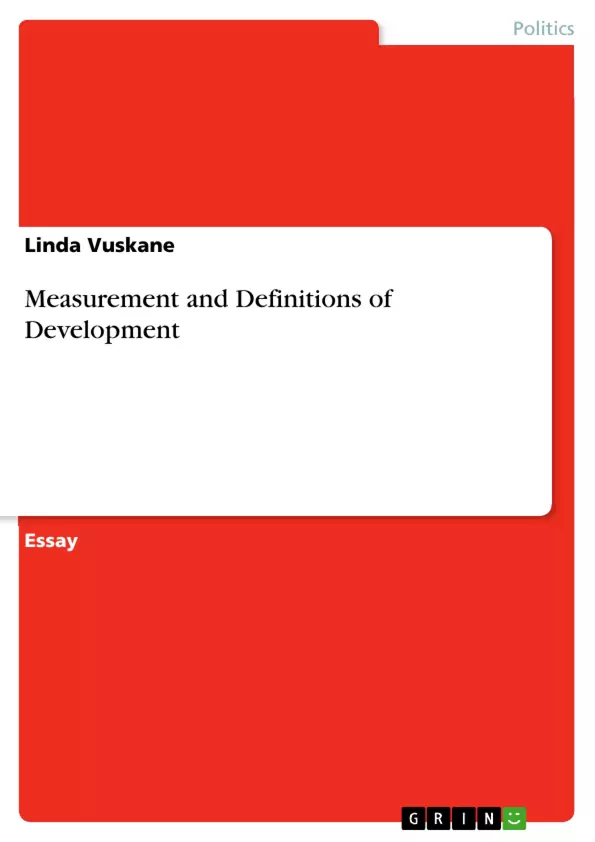Development is a concept, which can be viewed from different angles. Whether it is related with economic development or political, it generally refers to growth. Therefore, development is a key to the progress and stability of a country as well as its people. Finally, while economic growth is an important indicator, it should be used in combination with other indicators because growth is much more than economic development.
Table of Contents
- Defining Development
- Measuring Development
Objectives and Key Themes
This paper investigates the multifaceted concept of "development," aiming to clarify its definition and explore appropriate measurement methods. It addresses the contested nature of the term and examines various perspectives on its meaning and application.
- Defining Development: Exploring diverse interpretations and implications of the term.
- Measuring Development: Evaluating economic growth indicators and alternative approaches.
- The Relativity of Development: Analyzing how cultural and societal contexts shape the understanding and measurement of development.
- Development and Modernity: Examining the relationship between development and concepts of modernity, including industrialization and technological advancement.
- Social and Economic Indicators of Development: Comparing different metrics, including GDP/GNP, Human Development Index (HDI), and poverty indices, and their limitations.
Chapter Summaries
Defining Development: This section delves into the complexities of defining "development," highlighting the lack of a universally accepted definition. It contrasts Chambers' simple definition of "good change" with Thomas's more nuanced perspective, which views development as progress towards fulfilling potential, encompassing improved living standards and societal well-being. The discussion further explores the relativity of development, acknowledging differing societal views on what constitutes "general good" and referencing the UN's emphasis on expanding people's choices. The section also links development to the concept of modernity, exploring its economic and temporal aspects.
Measuring Development: This section critically examines the measurement of development, primarily focusing on the limitations of solely relying on economic indicators like GDP/GNP. While acknowledging the prevalent use of these metrics, it highlights the issues of wealth inequality, the exclusion of remittances and non-economic factors, and the disregard for negative externalities. The discussion then introduces alternative approaches like the Human Development Index (HDI) and poverty indices (absolute and relative poverty), emphasizing the importance of incorporating social, political, and environmental factors to gain a more comprehensive understanding of development.
Keywords
Development, economic growth, modernity, Human Development Index (HDI), poverty, inequality, social indicators, economic indicators, measurement, definitions.
FAQ: A Comprehensive Language Preview
What is the purpose of this document?
This document provides a comprehensive preview of a paper investigating the multifaceted concept of "development." It aims to clarify its definition and explore appropriate measurement methods, addressing the contested nature of the term and examining various perspectives.
What topics are covered in the paper?
The paper explores several key themes, including defining development (examining diverse interpretations and implications), measuring development (evaluating economic growth indicators and alternative approaches), the relativity of development (analyzing how cultural and societal contexts shape understanding and measurement), the relationship between development and modernity, and a comparison of different social and economic indicators of development (GDP/GNP, HDI, poverty indices).
What are the key themes of the paper?
Key themes include the contested definition of development, the limitations of using solely economic indicators (like GDP/GNP) to measure development, the importance of incorporating social, political, and environmental factors for a comprehensive understanding of development, and the relationship between development and concepts of modernity.
How is development defined in the paper?
The paper explores various definitions, contrasting a simple definition of "good change" with a more nuanced view of development as progress towards fulfilling potential, encompassing improved living standards and societal well-being. It highlights the relativity of development and acknowledges differing societal views on what constitutes "general good," referencing the UN's emphasis on expanding people's choices.
How is development measured in the paper?
The paper critically examines the measurement of development, highlighting the limitations of relying solely on economic indicators like GDP/GNP. It discusses the issues of wealth inequality, the exclusion of non-economic factors, and the disregard for negative externalities. Alternative approaches like the Human Development Index (HDI) and poverty indices are introduced, emphasizing the importance of incorporating social, political, and environmental factors.
What are the limitations of using GDP/GNP as a measure of development?
The paper points out that GDP/GNP has limitations because it doesn't account for wealth inequality, excludes remittances and non-economic factors, and disregards negative externalities. Therefore, it provides an incomplete picture of development.
What alternative measures of development are discussed?
The paper discusses the Human Development Index (HDI) and various poverty indices (absolute and relative poverty) as alternative measures, emphasizing the need to include social, political, and environmental factors for a more comprehensive understanding of development.
What are the key chapters of the paper?
The paper includes chapters on "Defining Development" and "Measuring Development."
What are the keywords associated with the paper?
Keywords include: Development, economic growth, modernity, Human Development Index (HDI), poverty, inequality, social indicators, economic indicators, measurement, definitions.
- Quote paper
- Linda Vuskane (Author), 2010, Measurement and Definitions of Development, Munich, GRIN Verlag, https://www.grin.com/document/156384



